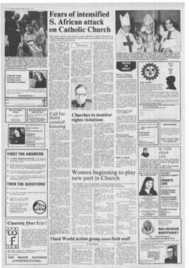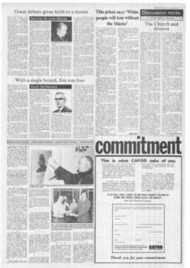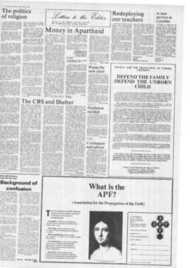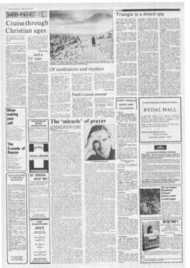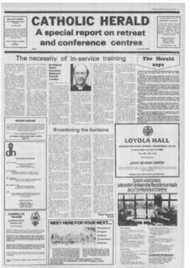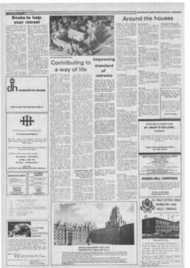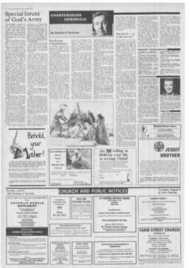Page 5, 29th July 1977
Page 5
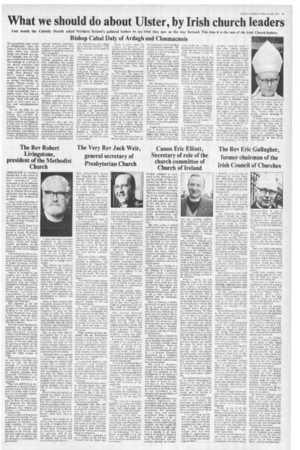
Report an error
Noticed an error on this page?If you've noticed an error in this article please click here to report it.
Tags
Share
Related articles
Understand Protestants Says Bishop
Irish Church Leaders Urge More Prayer For The Maze
Four Actions The Church Might Take On Ulster
A Flood Of Tributes To Ireland's Primate For The Past 12...
'end Direct Rule' Call By Bishop Cahal Daly
Canon Eric Elliott,
Secretary of role of the church committee of Church of Ireland
WHEN ASKED to comment on the difficulties facing the people of Northern Ireland one thinks first and immediately about the continuing violence and the drift into anarchy and chaos. There is a tremendous longing in the hearts and minds of people in this island, north and south, for security of life and limb, for confidence and trust between peoples and communities, and for an honest attempt to tackle discrimination and provide an opportunity for all to live a full and satisfying life.
The truth is that in Ireland each minority has the capacity to exercise a veto on the political aspirations of the majority in Northern Ireland and the majority in the whole island. To a growing number of people the problem in this island resolves itself into one in which you ask about the changes needed in order to create a society and social, political, economic and legal structure in which each community feels that its culture, identity, religions, traditions and way of life are secure.
This in turn is leading to a growing interest in pluralism, in the building of a genuinely pluralist society in Ireland, north and south, in which each community will feel assured and secure, and in which the primary thrust would bc a concern for the rights, dignity, and freedomof individuals and communities. These rights would be limited by law only in so far as their exercise interfered with the reasonable rights of others.
There is, however, a further problem to be faced. In Ireland we are all quick to use terms like pluralism, freedom, justice and democracy defensively to justify our own position. We're all committed to justice until we come to define it. We believe in pluralism and democracy and then proceed to use these words to justify affairs in Northern Ireland before 1969 or to justify the present ordering of society in the Republic.
The fact is that in Ireland two concepts have to be renounced as an essential precondition of any movement towards peace and reconcilliation. These are any commitment to, or any desire for, a 'confessional' state, be it a Unionist Protestant government for a Protestant people in Northern Ireland or a Gaelic Roman Catholic state for a united Ireland.
The claim in Northern Ireland that there was a Protestant goverment for a Protestant people was paralleled by the development of the South as a Catholic and Gaelic Republic. Just as in Northern Ireland little was done in terms of concessions to the Northern Roman Catholic minority so the governments in the South made no real concessions to the traditions and susceptibilities of Northern Protestants.
The last eight years have seen dramatic legislative, administrative and social changes in Northern Ireland. These have affected housing, jobs, electoral boundaries and methods, voting, local and central government. What is urgently needed at present is not so much further reforms and changes, but the understanding, sympathy and will to make the reforms of the last eight years work effectively and smoothly. It is a mistake to see these reforms in Northern Ireland as a result entirely of pressure from Westminster and the northern minority on a reluc tant and unwilling majority. Such claims fail to do justice to the significant number of Unionists, Loyalists and Protestants, who identified themselves publicly with the reforms needed to remedy reasonable grievances.
The same period has not seen, however, anything comparable in terms of changes in the Republic, which could be seen as representing concessions to the traditions and susceptibilities of Northern Protestants. Admittedly, and we are grateful for it, there is evidence of a more realistic attitude to the question of unity on the part of a growing number of politicians and others in the Republic. But this attitude has not been expressed in terms of the specific changes needed in the Republic.
Where, then, do the Churches come in? The first thing we have to do is admit that is there a powerful sectarian dimension in the hitherto irreconcilable division between the two communities. This is not to deny the presence of other powerful factors. But for far too long and too often we in the Churches have tried to play down and even deny the "religious" factor. We are part of a divided society. We have allowed ourselves to be, in some ways we have even chosen to be, part of the division. We have so over-identified with the rights, aspirations and culture of our own community that the use of denominational labels to indicate the two "sides" has a certain justification. It is more than time that we admitted this failure in our role in public life in this island. Until we do this and face together and resolve the issues on which we are divided, such as mixed marriages, education, family planning, nullity and divorce law and morality, and pluralism, until we show that we are more concerned about human rights than sectarian, denominational and community rights, until we do this and create a real sense of Christian community, then our reconciling role is limited and is to some extent ineffective.
One commentator has summed up Church relationships in Ireland in this way. We have moved from closed defensive to open defensive positions. The time has now come, and is already past, for moving to completely open positions.
However, the Churches should face honestly the challenge expressed in the following words from an article earlier this year by the religious affairs correspondent of one of our national papers.
"It is a sad thing, but the bitter truth is that until the Churches begin to lose this economic support (ie of their congregations), they will not change in any significant way. And without this change, they will have nothing of importance to contribute to the paramount task of solving our present tragic problem."
blog comments powered by Disqus



